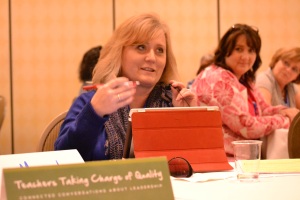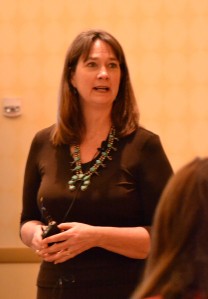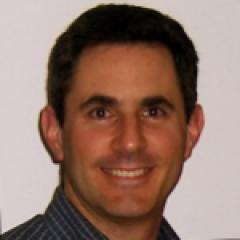CTA Expanding Teacher Leadership

Christal Watts, President of the Vallejo Educators Association, speaking at the Good Teaching Conference in San Jose.
I spent Friday at a pre-conference workshop for the Good Teaching Conference put on by the California Teachers Association, talking and working with teachers dedicated to improving our profession, and seeing our union as instrumental to that improvement. (This was the Northern California conference. The Southern California conference takes place next month).
Presenters Stacy Begin and Jane Robb, both staff members for CTA’s office of Instruction and Professional Development (IPD), asked the workshop participants about our goals when we chose to attend a workshop titled, “Teachers Taking Charge of Quality.” Some of the answers included:
- Working on quality is really about teachers taking control of the profession.
- I want to find my role in school leadership.
- I’d like to have my local association take on a greater role in developing teaching quality.
- I want to help create a school environment where it feels safe to share and collaborate.
That last item might strike some readers as a bit odd, if you’re not a teacher, or if you’ve only worked in schools where such a culture is the norm. However, to many teachers and others with experience in less collaborative schools (or other work settings), that comment will resonate. Unfortunately, it can be seen as threatening or confrontational when we enter into hard conversations about what works and what doesn’t work in our instruction. It’s an essential point that many education “reformers” fail to account for when they propose or impose policies that create winners and losers among teachers. Performance pay bonuses for the best teachers requires classification that carries high stakes consequences, and such classification creates a disincentive for collaboration.
But this workshop focused on the positive, envisioning what we could accomplish by working together at schools, encouraging labor-management collaboration to improve professional development and community engagement. It was encouraging to learn that there’s a recent, large-scale report that provides quantitative evidence showing distributed school leadership leads to improved student learning. Learning From Leadership: Investigating the Links to Improved Student Learning, funded by the Wallace Foundation, studied 180 schools in 43 districts, over a period of six years.
This report is the largest to date to confirm through quantitative data that effective school leadership is linked to student achievement. Principals are the central figures in leadership, this study concludes, but top schools also benefit from a “collective leadership” that includes teachers and others in decision-making.
With that guiding principle in mind, the conference session also focused on some practical, but challenging questions: what do teacher leaders need to know and be able to do? There are now published Teacher Leader Model Standards (website; large PDF) to help guide individuals and school systems interested in expanded and more effective teacher leadership. Setting aside concerns about the lack of teachers’ direct participation in the creation of the standards, I think the end result is a useful resource. The National Board for Professional Teaching Standards has a similar endeavor underway; these standards will, in the near future, provide the basis for a teacher leader certification from the National Board. Another good resource for teacher leadership development and assessment is the Center for Strengthening the Teaching Profession (based in the state of Washington); at this conference we reviewed CSTP’s self-assessment for teacher leaders, which directs teachers to look at their leadership efforts in very discrete elements, provide evidence for their effectiveness as leaders, and reflect on specific goals and means to continue developing as leaders. (See this page for more information, resources from CSTP). As powerful as these models are shaping up to be, and as enthusiastic as I am about promoting teacher leadership, I have to confess there’s something intimidating about the material as well. That’s probably a good thing. If teacher leadership is going to expand and take hold as a significant force for improving the teaching profession, the expectations have to be high and the outcomes have to be clear and positive.
On a side note, we already have a California example of these standards being put to use in systematic way to expand teacher leadership. Riverside County began expanding its use of teacher leadership, but learned that effective teachers who should be engaging in leadership do not necessarily have the necessary skill set to be effective in their work with professional development and adult learners. Last year, the Riverside County Office of Education launched its Teacher Leadership Certification Academy, guiding teacher through a two-year learning process designed around the domains of the Teacher Leader Model Standards. At the conference on Friday, participants discussed these domains and shared some thoughts about where the challenges lie within each one. Here are the domains, with some comments from conference participants:
I. Fostering a Collaborative Culture to Support Educator Development and Student Learning– Teachers from Twin Rivers Unified School District shared some thoughts about this domain, grounding their comments to their district’s innovative Algebra Success Academy. I noted in particular that school culture takes time to evolve; their comments highlighted the importance of colleagues seeing each other work, which requires building trust. (Note: I’ve written about this program before. See Curriculum Design and School Partnerships part of a series of teacher leader profiles linked to the most recent ACT report on compensation and teacher career pathways).
II. Accessing and Using Research to Improve Practice and Student Learning -This domain challenges teachers and school leaders quite a bit, not only because it requires a different skill set for many practitioners, but also because there is so much research, and varying interpretations of the research. In this domain I think it helps to identify trusted sources who not only conduct research, but review and consolidate research. It’s essential for teacher leaders to take up this challenge. For example, if a district intends to implement teacher evaluation based in part on value-added research, it’s essential to know how many times that approach has failed, how many studies have found it unreliable, and how consistently national and state leaders in research and policy have reviewed all of the research – and come down against VAM for teacher evaluation. (See almost any of these posts).
III. Promoting Professional Learning for Continuous Improvement –This particular domain didn’t inspire much conversation, probably because it was so self-evident the people in the room. Moving from principle to practice does raise an important question, however: how do we make sure learning really leads to improvement? We need to be able to answer that question in order to be most effective, and also to justify the expense. And this domain bounces us right back to Domain II, because we have to be able to respond to research that will not always back up what we perceive as valuable learning. For example, “research” has found that obtaining a master’s degree does not reliably improve teaching; do we take that research at face value, or do we question the methods and assumptions in the research?
IV. Facilitating Improvements in Instruction and Student Learning –There was an interesting comment in this portion of the discussion. One teacher said that “Coach is a dirty word in my district,” referring to instructional coaches. How do we ensure that teachers entrusted with leadership roles are qualified, skilled, trained, and supported in such a way that their work is valued and put to the best possible use to improve teaching? And how do we cultivate school cultures that allow for gradual change and learning? When there’s distrust in a process or a new method, I think it follows that some teachers will be ready to pounce on mistakes in order to undercut the validity of an initiative like instructional coaching.
V. Promoting the Use of Assessments and Data for School and District Improvement –For teacher leaders, current and aspiring, there are tons of questions that arise in this domain. Who chooses the assessments? How many? What type? Who schedules them? How aligned are they with student needs? With students’ developmental stages and language acquisition? To what extent do these assessments align with what teachers are teaching, and what we want students to learn? What’s missing from our assessments and data sets?

Alicia Williamson, President of the Cambrian District Teachers Association, describes her district’s community outreach efforts.
VI. Improving Outreach and Collaboration with Families and Community –

Cate Schroeder describes her success in promoting National Board Certification in San Jose Unified School District.
I think this domain, and the next, are the two most often missing in our discussions right now. We need to listen, engage, respond, communicate effectively, and help educate our community partners in schools and districts. In this domain we heard a great example from Alicia Williamson, a union president and a commisioner 0n the California Commission on Teacher Credentialing. Her local association has begun a book give-away program at their local farmers market, providing them with an opportunity to promote literacy and make themselves visible and accessible within the community.
VII. Advocating for Student Learning and the Profession –This domain is the one I’ve focused on the most in my own work. In comments at the conference, I heard frustration that sounded quite familiar. Another teacher noted that sometimes it feels futile, as if decisions have been made without teachers, and any requests for our input or allowances for public comments are merely for show. This teacher also wondered how many of us have the energy to do what is often an exhausting job, and then take up the challenges of leadership and advocacy for the profession? Conference attendees had the chance to hear from one teacher who has undertaken a successful effort to advocate for the profession in our region. Cate Shroeder’s efforts to build union and district support for National Board Certification candidate were just getting underway at the 2012 Good Teaching Conference. A year later, her efforts have led to union support that greatly multiplied the number of teachers pursuing board certification, and she’s now working on the district to facilitate some fundraising to sustain these efforts.
The conference session concluded with the idea that we need many leaders, and many different kinds of leaders, to improve schools, districts, and our profession overall. In its totality, teacher leadership may be daunting, but it’s not necessary – not even possible – for any individual to lead at every level, providing all the types of leadership we need in order to progress. We can all contribute. Another way of breaking down the broader challenge of growing leadership is actually to focus on verbs rather than nouns: “Leading and following are not expressions of who we are but of what we do – in a specific meeting, committee, project, organization or institution” (Marshall Ganz). Thus, we all have the capacity to lead and follow, depending on the context, and being a supportive follower is an essential part of helping leadership succeed.
[all photos by the author, 2/8/13]
This blog post has been shared by permission from the author.
Readers wishing to comment on the content are encouraged to do so via the link to the original post.
Find the original post here:
The views expressed by the blogger are not necessarily those of NEPC.
